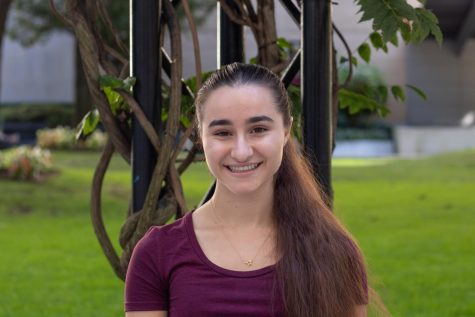One Step Closer to Resolving International Students’ Health Care
Fordham held a town hall to find a compromise between inexpensive health care and quality coverage
A health insurance card sticks out of a student’s wallet. Fordham requires all students to have health insurance, but some international plans are not allowed after policy changes made last semester.
November 10, 2020
When many international students were denied the option to use their own health insurance at the start of the semester, 48 of the affected international students signed a petition that was emailed to the Fordham administration on Sept. 3. After two months of waiting, a town hall was held on Wednesday, Nov. 4, to clarify and resolve the issue.
“I think we made a good achievement in the town hall,” said Levy Li, Graduate School of Arts and Sciences (GSAS) at Rose Hill ’21 and an international student from China. Li, along with a few other international students, had been emailing the university about the issue since September.
Fordham updated its health insurance criteria during the spring 2020 semester, now requiring that international students have an Affordable Care Act (ACA)-compliant alternative health care plan to waive the university health insurance, Aetna.
Li said that many students raised their concerns at the town hall about the ACA compliance restriction and that the university seemed open to reforming its current guidelines.
Even if the plan is based in the U.S., if the company is financed overseas, it will not be subject to state insurance laws that protect the consumer within that state.
The ACA compliance requirement is intended to guarantee that any alternative plans international students purchase will cover preexisting conditions, prevent unreasonable rate increases, have no monetary limits on medical care and cover a number of prescription pharmaceuticals.
According to Gregory Pappas, assistant vice president of student affairs, these guidelines are the “gold standard” colleges use to evaluate health care. Fordham decided to adopt these standards to apply to international students last year after discovering that many foreign insurance plans do not guarantee coverage for COVID-19.
Even if the plan is based in the U.S., if the company is financed overseas, it will not be subject to state insurance laws that protect the consumer within that state.
Conflict arose when many international students purchased a foreign plan, UnitedHealthcare, through a broker. Even though the company is U.S.-based, it is financed internationally, and therefore students covered by this foreign plan will not be subject to the same changes and regulations afforded by the ACA.
“We have many international students that do not buy the Fordham plan — we do accept other domestic plans that are much more affordable.” Gregory Pappas, assistant vice president of student affairs
International students at the town hall seemed to understand this reasoning behind the change; however, they were unhappy with their limited options for affordable premiums if they are required to purchase an alternative domestic plan or Aetna.
Pappas addressed students’ concerns about unaffordable domestic plans, stating, “we have many international students that do not buy the Fordham plan — we do accept other domestic plans that are much more affordable, and actually some of the students on the call have actually bought those plans already.”
U.S. domestic health care plans generally have much higher premiums than foreign plans because of greater coverage and highly paid specialists and doctors. UnitedHealthcare offers domestic plans as well, but depending on the student’s income, they may not be eligible for an ACA-subsidized plan. This could make purchasing a domestic plan more expensive than Aetna, which includes a $150 administrative fee to Fordham.
Another option for international students instead of the domestic plans or Aetna is to opt into New York state insurance plans, such as NYC Care, Essential Plan or Marketplace plans, which have little-to-no cost. Choosing these plans, however, can have consequences, such as affecting international students’ future visa statuses, Li said.
A revision to the ACA under the Trump administration states that a resident who receives public benefits, such as enrolling in state-issued health care, “is generally inadmissible to the United States and ineligible to become a lawful permanent resident,” according to the U.S. Citizenship and Immigration Services.
Zifan Li, GSAS ’21 and an international student from China who coordinated the town hall, said that he thinks there is more work to be done on resolving the issue, but that a lot of progress has been made at the town hall.
Fordham representatives “agreed to seek a better option with us in the future and they said they are open and welcome any opinions and ideas,” he said.
The representatives and students decided that the next step will be to design a survey issued to all the international students at Fordham composed of specific questions, including whether having to abide by ACA guidelines instead of ACA compliance is preferred, whether students have found Aetna beneficial and if they have felt burdened by medical costs.
Zifan Li said that he plans to design the survey with the help of other international students, and the university will be in charge of distribution.
Levy Li said that he believes removing the ACA compliance requirement is still negotiable with the university.
While Fordham does not require its international students to purchase the university-issued plan, Pappas said that some colleges do require this because it allows the university to monitor the plan and actually lowers the premium. By increasing participation level, “they can have a very robust benefit-offering and a low premium rate,” he said.
Pappas suggested adding mandatory participation on the school plan to the survey as well because it may solve the issue of high premiums for complete care.
On behalf of other international students, Levy Li said that he believes removing the ACA compliance requirement is still negotiable with the university and it will better serve international students to choose their preferred health insurance plan. Yet, Pappas regards the foreign plans as too risky to allow students to be covered under, even if the benefits offered are comparable and it meets the ACA criteria.
“It’s not a domestic plan, so we don’t even know if that company is going to be around a year from now,” he said. “If it’s not a domestic plan, it is not subject to state insurance department laws and related oversight that protect the consumer. Students have to carefully read the fine print even with domestic plans to insure appropriate coverage.”
By requiring that a company is subject to ACA rules and guidelines, the university aims to prevent students from having to pay out-of-pocket after having a health emergency if the company doesn’t cover something specific or changes its guidelines.
Most international students struggle with finances because the total financial package of attending U.S. universities includes plane tickets, visa fees and international student add-on fees.
“The main reason students can’t maintain enrollment is because of finances, and the main reason that people have difficulty with finances is because of a health issue or an inappropriate insurance — we know that statistically,” Pappas said.
It is true that, statistically, the U.S. has more cases of bankruptcies due to medical bills compared to other countries because of its health care system. It is also true that international students generally list finances as the main reason for not continuing with education. However, most international students struggle with finances because the total financial package of attending U.S. universities includes plane tickets, visa fees and international student add-on fees in addition to their general enrollment costs.
Additionally, international students do not receive federal aid and have proportionally lower financial aid to their total cost of admission than domestic students.
Levy Li felt that the town hall met his expectations and that there was a general consensus that both the administration and students would continue to work toward a compromise. He said that there will be future meetings held, especially since only about 10 international students were able to attend.
Going forward, Levy Li emphasized the need for the town hall to be held on a weekend and during the evening since many students are dealing with time-zone differences and work schedules.















